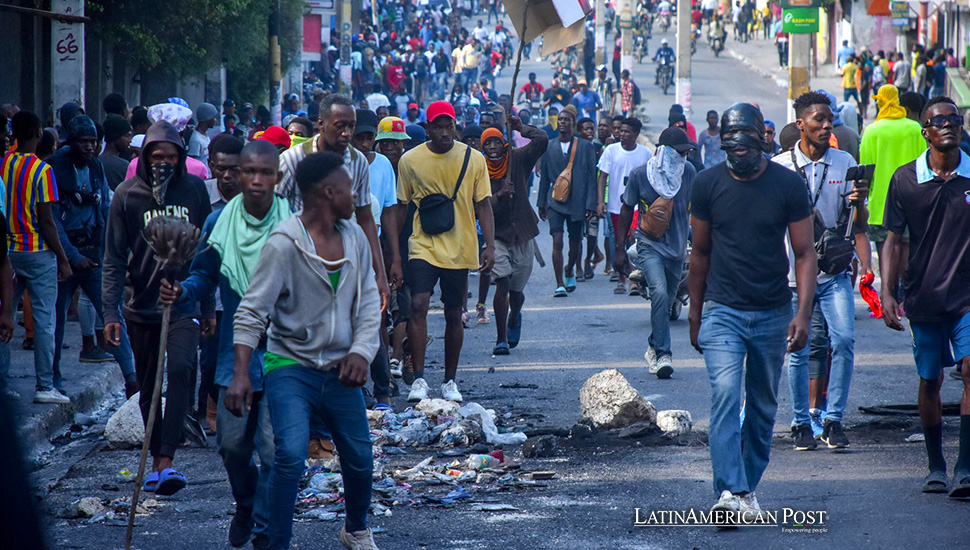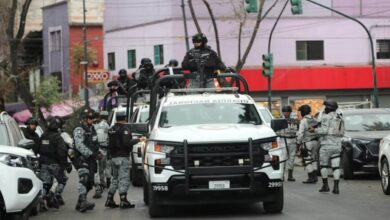Haiti Descends Further into Chaos as Protests Erupt Against Unelected Government Amid Gang Violence

Hundreds of Haitians took to the streets in a powerful demonstration against the unelected government of Prime Minister Ariel Henry amidst a backdrop of escalating gang violence that has seized control of the capital and terrorized local communities.
Dissent Erupts on the Streets of Haiti
In a vivid display of public dissent, the streets of Haiti became the stage for a significant uprising against Prime Minister Ariel Henry’s administration on Monday. The unrest comes in response to a worsening security situation under Henry’s unelected government, which has witnessed the alarming expansion of violent gang alliances dominating the capital and its surrounding regions. Since assuming power in the aftermath of President Jovenel Moise’s assassination in 2021, Henry’s tenure has been marked by a deepening power vacuum that has facilitated the ascendance of powerful gangs, notably the G9 and G-Pep alliances.
The situation on the ground has grown increasingly dire, with frequent clashes between rival gangs, the national police, and civilian vigilante groups causing widespread devastation. The consequences for residents have been catastrophic, encompassing indiscriminate killings, rampant sexual violence, lootings, kidnappings-for-ransom, and arson. These acts of violence have instilled fear and uncertainty across communities, fundamentally altering the fabric of everyday life in Haiti.
In an attempt to quell the protests, national police resorted to using tear gas, dispersing crowds who retaliated by setting fire to car tires, blanketing the streets in clouds of gray smoke. This chaotic scene underscores the profound frustration and desperation felt by many Haitians, who see their government’s inability to stem the tide of violence as a betrayal of their trust and safety.
Displacement and Hunger Grips the Nation
The human toll of this crisis is staggering, with the head of Human Rights Watch estimating earlier this year that approximately 300,000 people have been internally displaced due to the violence. The United Nations has further highlighted the plight of the country’s children, estimating that 170,000 are internally displaced, and nearly half of the Haitian population is facing hunger as the ongoing conflict severely restricts the movement of food, aid, and people across the nation.
The protests against Prime Minister Henry’s government reflect a deep-seated demand for change and an end to the cycle of violence and political instability that has plagued Haiti for far too long. The demonstrators’ actions signal a critical juncture for the nation, calling into question the legitimacy of an unelected administration amidst a crisis that demands decisive and compassionate leadership.
As Haiti grapples with these multifaceted challenges, the international community must not remain silent. The escalating violence and humanitarian crisis necessitate urgent attention and support to restore peace and stability. The plight of the Haitian people underscores the pressing need for a comprehensive strategy that addresses the root causes of the violence, promotes political reconciliation, and ensures the delivery of essential services and aid to those most in need.
A Glimmer of Hope: Haitian Resilience Amidst Adversity
The situation in Haiti serves as a stark reminder of the devastating consequences of political instability and unchecked violence. As the world watches, the resolve and courage of the Haitian people stand as a testament to their unwavering demand for a government that represents their interests and protects their rights. The path forward for Haiti is fraught with challenges, but it is also filled with the possibility of change and the hope for a future where peace and justice prevail.
Also read: Brazil Bolsters Northern Border Amid Venezuela-Guyana Esequibo Tensions
The protests in Haiti are more than a reaction to the current administration’s failures; they are a cry for help and a demand for a fundamental shift toward governance that prioritizes the well-being and security of its citizens. For Haiti to emerge from this crisis, it will require solid and legitimate leadership within and a concerted effort from the global community to support the nation in its journey toward recovery and reconciliation. The resilience of the Haitian people, even in the face of such adversity, offers a glimmer of hope that a peaceful and prosperous Haiti is within reach with the proper support and commitment.





